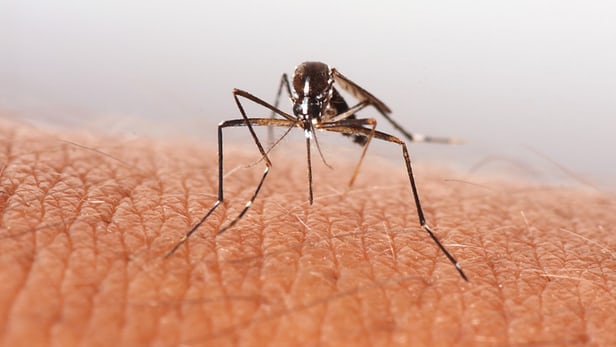
While the zika virus might be grabbing all the headlines these days, malaria continues to hold the dubious honor of being the most deadly vector-borne disease, claiming the lives of more than 400,000 people each year. No cure has been found yet, though scientists have been attempting everything from altering the mosquitoes' sense of smell to rendering them infertile. That said, a recent study by researchers at Johns Hopkins University School of Medicine has identified a new approach: changing how humans smell and taste.
In order to find a human host, mosquitoes have to rely on their sense of smell. Female Anopheles gambiae mosquitoes, in particular, have a strong preference for humans and use olfactory cues to locate and distinguish us from other mammals. But what if scientists could figure out what smells turn them off so that we could change our "flavor" to something less mouthwatering?
To head down that path, the researchers decided to find out what makes mosquitoes' sensory neurons tick. "All mosquitoes, including the one that transmits malaria, use their sense of smell to find a host for a blood meal. Our goal is to let the mosquitoes tell us what smells they find repulsive and use those to keep them from biting us," says Dr. Christopher Potter, an assistant professor of neuroscience at the Johns Hopkins University School of Medicine.
Given that their survival depends on their sense of smell, it comes as no surprise that mosquitoes have an intricate sensory system that comprises not one but three pairs of "noses": two antennae, two maxillary palps (the appendages located in the lower region of the mosquito's head) and two labella (neuron-dense regions at the tip of its proboscis).
To understand how the Anopheles gambiae mosquito makes sense of the odors and tastes it encounters, Potter and his colleagues did what they claim no other team had previously done in the field of mosquito research. They targeted the insect's sensory neurons by using a powerful genetic technique that would cause certain neurons, specifically those that receive complex odors through proteins called odorant receptors (ORs), to glow green.
The experiment revealed a surprise: Previously, the subesophageal zone in an insect's brain had only been associated with taste. However, the fact that signals from the OR neurons from the labella were also being sent there suggests that mosquitoes don't just like our smell but our flavor as well, says Dr. Potter. "It's likely that the odorants coming off our skin are picked up by the labella and influence the preferred taste of our skin, especially when the mosquito is looking for a place to bite."
Based on the results of this study, targeting the antennae and maxillary palps, which are used to pick up long-range signals, as well as the labella, which probes the skin before the mosquito bites its victim, could potentially open up new ways of repelling the mosquitoes. "One could target the antennal neurons and reduce the likelihood that they come too close, while another could target the labellar neurons and make the mosquitoes turn away in disgust — before sucking our blood — if they got close enough to land on us," suggests Dr. Potter.
While it is still early days for this project, he hopes that the newly decoded genetic system will make it easier for researchers to generate new traits using genetically altered mosquitoes and see how the neurons respond to different smells and tastes. The goal, he says, is to find an odorant that acts as a strong mosquito repellant at "very low concentrations" while remaining "safe and pleasant-smelling for us."
In addition, he hopes that further studies of the mosquitoes' other neurons will shed light on how their three receptors shape and influence behavior. "We'd like to figure out what regions and neurons in the brain lead to this combined effect. If we can identify them, perhaps we could also stop them from working."

 Previous page
Previous page Back to top
Back to top







